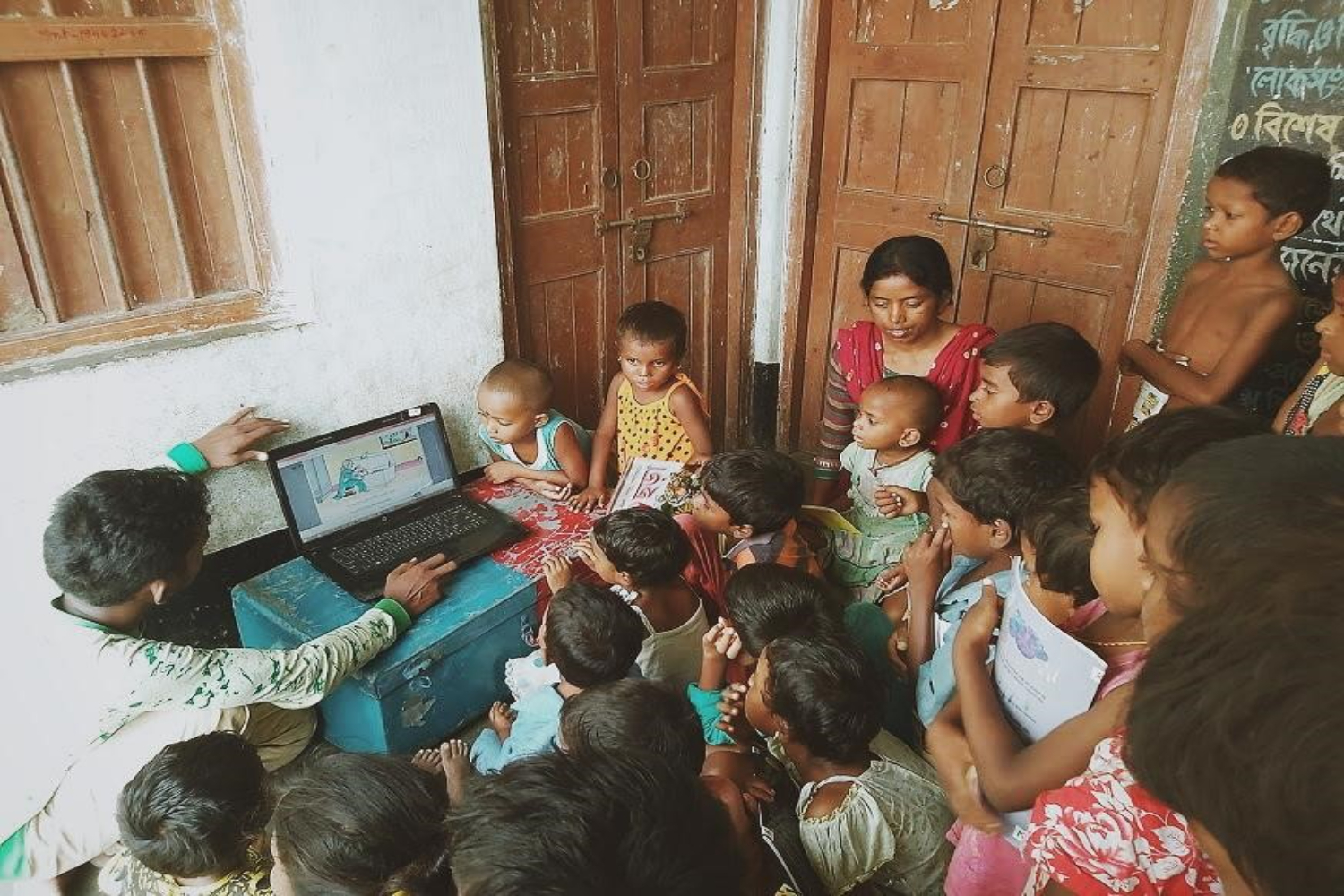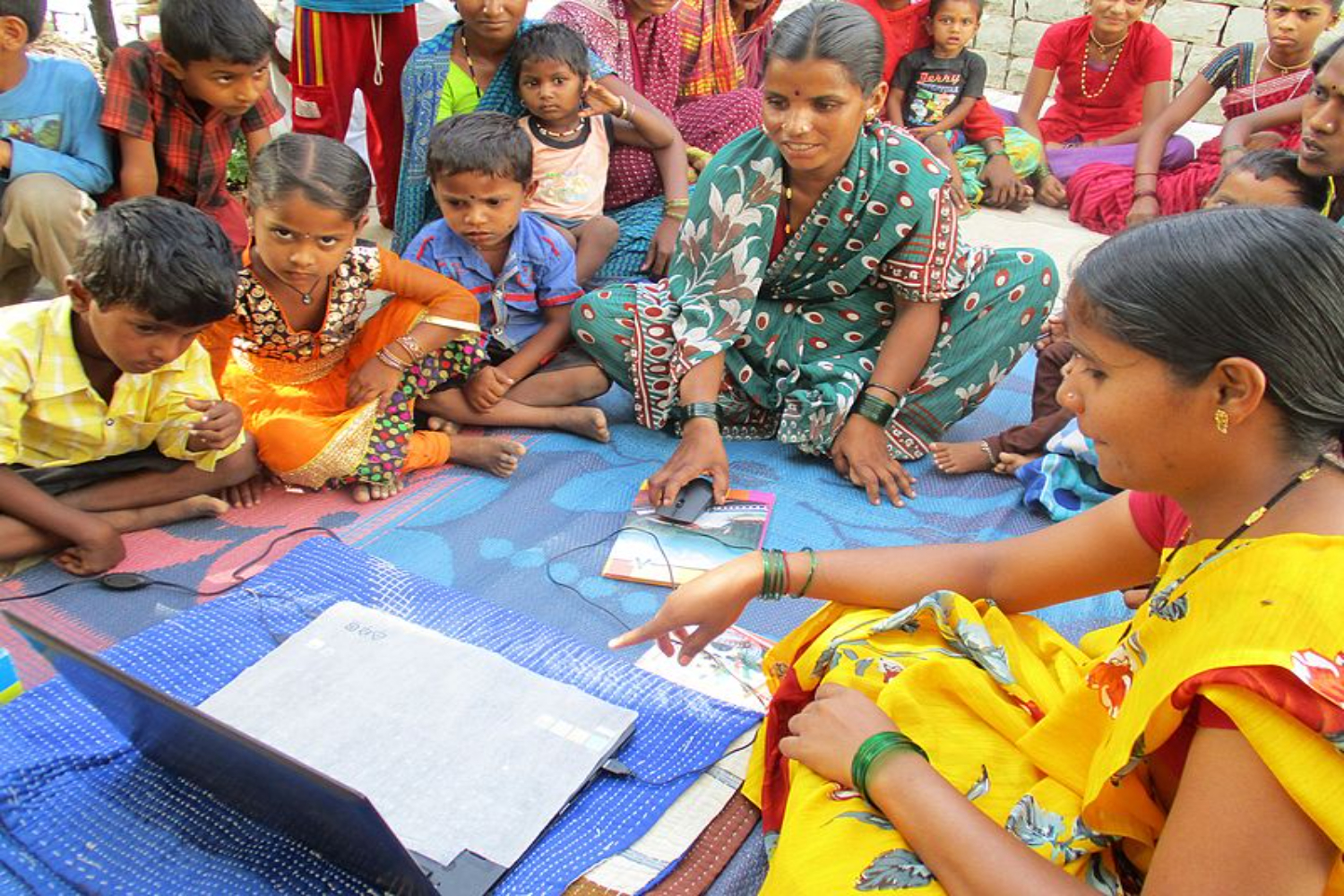The power of open: how Pratham Books’ StoryWeaver is creating access to children’s storybooks at scale
Purvi Shah shows how the StoryWeaver platform is trying to create access to quality storybooks for children, at scale.

“ My students speak Pawari, a tribal language spoken in Maharashtra. Pawari is a dialect, and hence, no written material is available in that language. The language of instruction in schools is different from their home language, creating learning difficulties.” – Amit Dudave, a teacher from a Zilla Parishad Primary School shares the challenges faced by his students in Jalgaon, Maharashtra.
Mr. Dudave’s experiences are not isolated. UNESCO (in its Global Education Monitoring Report Policy Paper 24, titled ‘If You Don’t Understand, How Can You Learn?’, and published in February 2016) estimates that 40% of people globally do not have access to an education in their own language. For children to become readers, they must have access to books in the languages they speak and learn in. There are not enough books, in not enough languages, for children to learn and practise reading. If we are to achieve our commitment towards universal literacy for all children by 2030, we face the fundamental challenge of bringing books to millions of children in an accelerated and sustainable manner.
The StoryWeaver journey
StoryWeaver builds on the legacy of Pratham Books (a non-profit children’s book publisher in India, set up in 2004) to address the global inequity of not having enough books for children in their mother tongues. This platform provides open and free access to high quality, openly licensed, multilingual storybooks from Pratham Books and other reputed publishers.
The goal is to promote reading acquisition among children. The storybooks are levelled and diverse. They include early readers, fiction and nonfiction books based on science and math concepts, the environment, biographies and more.
The StoryWeaver platform is digital. However, the books are available in multiple formats to overcome the issue of digital access. These can be read online, offline or downloaded and printed. StoryWeaver has simple tools embedded on the platform. The tools allow users to further translate (and create versions of the books) for localized requirements. These resources then become available to other users as well. This process creates a multiplier effect and amplifies impact.
StoryWeaver has leveraged the power of technology and the open licensing framework. This has resulted in the creation of books such as those translated by Amit Dudave into Pawari. He has read these books to hundreds of children in his school and community.
StoryWeaver builds on the legacy of Pratham Books – a non-profit children’s book publisher in India, set up in 2004.
Opening up windows to new worlds through the joy of reading
StoryWeaver was launched in September 2015 with 800 books in 24 languages. Today, there are over 47,000 books in 327 languages. These have been read over 100 million times on the platform. Of these, 70% are underserved languages, for which books are scarce or even non-existent. These books are being used by Ministries of Education, literacy organizations, language collectives and digital and non-digital applications to improve children’s reading and learning levels.
Our storybooks have travelled far and wide, reaching millions of children in India and across the world. At a government school in Kota, Rajasthan, a group of fifth graders read a Pratham Books title called ‘How do Aeroplanes Fly?’. This book explores the idea of biomimetics by drawing parallels between the structure of an aeroplane and that of a bird.
The story is told through the eyes of a young girl called Sarala, who grows up to become a pilot. Some of the young girls in the group in the government school in Rajasthan said that they did not know that girls could fly planes. They also shared that this story had helped them imagine a new future for themselves.
Building communities of practice
Using the nearly two decades long experience in developing original content and translating it into multiple languages, we have developed tool kits, training modules and manuals for organizations and educators interested in translating into new languages. We have also developed a translation sprint workshop model. This has been used extensively in many countries to translate books. This model includes a peer-to-peer review system. It aids the quality checking of books that are created.
The African Libraries and Information Associations and Institutions (AfLIA), an organization working to promote mother tongue reading across 28 countries in Africa, held a series of translation sprints. More than 200 books were translated into Ewe, Fante, Hausa, Igbo, Isixhosa, Kikuyu, Luganda, Swahili and Yoruba on StoryWeaver in these sprints. The translated books have been used in the ‘Read Africa Read’ campaign.
Closer home, Suchana in West Bengal, India has been able to translate over 200+ books into the indigenous languages of Santali and Kora. Fuelled by the success of creating these digital books, Suchana printed 10,000 copies for distribution in local schools.
Responding to ground realities
There is a real and present need to find and publish diverse and inclusive narratives that represent the experiences of the entire Global South. We started with publishing 200 storybooks across languages with publishers like Room to Read and Sub-Saharan Publishers.
The aim was to expand our repository of storybooks on the platform. These collaborations took shape after much deliberation on how open licensing works and how StoryWeaver could help version existing storybooks into multiple languages.
In the early years of our journey, as we built the platform, we heard from many practitioners that internet access was an issue in remote areas, not just in India but in other parts of the Global South as well.
To address these concerns we built an Offline Library on StoryWeaver using Progressive Web App (PWA) technology. This allows users to save books on their devices. These could then be accessed without the internet without compromizing on the StoryWeaver reading experience.
Similarly, translation partners from Africa and India were unable to use StoryWeaver uninterrupted. This was because they lacked access to desktops and stable internet connections.
It led to the development of the ‘Offline Translate’ feature on StoryWeaver. It enables users to save books to the ‘Offline Translate Library’. They can then translate the stories without the internet, and then sync and publish the translations once they have internet connectivity.
As we scaled into more marginalized languages, we found that many onground partners did not have access to desktop devices and laptops. Sauramandala, an organization working in North East India was one such partner. They work on translating children’s storybooks into indigenous and underserved languages like Garo, Khasi, Paite, and Zou. Mobile phone penetration was high in the community. Therefore, we developed a Mobile Translate feature on StoryWeaver. This has been used to translate 2000 storybooks into 109 languages (mostly underserved) on the platform.
The right to read through the pandemic and beyond
2020 was a year like no other. All over the world, the shadow of the COVID-19 pandemic loomed large. School closures brought an abrupt end to the planned learning journey for months to come. In the state of Maharashtra alone, 5.3 million government school students were bereft of their regular learning environment.
In response, StoryWeaver, Maharashtra State Council of Educational Research & Training (MSCERT), Integrated Child Development Services (ICDS), and UNICEF came together to create Goshticha Shaniwar, (Saturday of Stories), a Reading Program designed to keep the joy of reading alive while children were at home.
Every Saturday, teachers, parents and volunteers would receive and disseminate the all-digital ‘package’ of storybook, posters, and activities via WhatsApp. Ms Sheeta Katkar, a parent whose daughter goes to a municipal school in Mumbai, received these stories during the lockdown.
She reminisces, “My daughter loved reading the storybooks shared on StoryWeaver and asking questions related to the topic. Once, while reading a story about a baby, she asked me about how she was as an infant. We then spent the rest of the afternoon discussing stories about not just her, but also her brother’s and my childhood. It was fun!”
The program shone a light on the role remote learning can play in a student’s life. As children return to school, it falls upon us to continue this momentum. We need to keep building foundational reading skills by providing regular online and offline access to interesting, relevant storybooks in mother tongue languages. Children who read are able to think more, are able to express themselves more freely, and become independent learners.
In our continued efforts to reach more children, we also partnered with the Central Board of Secondary Education (CBSE) and Central Square Foundation (CSF) to launch the CBSE Reading Mission. This is a two-year-long initiative open to all 25,000 CBSE schools across India. Under the Reading Mission, CBSE schools and teachers have enrolled in the Pratham Books Reading Program. This is available for free in English and Hindi on StoryWeaver.
Shalini Gupta, a CBSE teacher in Purkal, a village on the outskirts of Dehradun, Uttarakhand, narrated ‘Gulli’s Box of Things’ to her students, which helped them build their vocabulary. After the storytelling session, her class was divided into teams. Just like in the storybook, they identified a problem or a situation. Then they tried to find an object around them that could solve the problem. They also did a class project where they created something out of waste material gathered from home and in school.
Democratizing access to books and kindling the joy of reading
In a world where six out of every ten children are not achieving minimum proficiency in reading, the road to literacy – and UN Sustainable Development Goal 4, quality education – is an uphill climb. We are less than a decade away from 2030, that time in the future by which nobody is expected to be left behind.
Yet in sub-Saharan Africa, 88% of middle-school children cannot read properly. In South and Central Asia, 81% of children are not learning the basic minimum. Closer home in India, half of children with three years of schooling cannot read at their grade level.
The obstacles are many. These include a shortage of schools and teachers for millions of children. This is compounded by a dearth of local language reading material for 40% of the students. StoryWeaver is committed to providing children with the very first step to literacy acquisition – storybooks. With StoryWeaver, we are drawing upon the best of technology and open licensing to ensure that children can have uninterrupted access to the books they so richly deserve to read and enjoy.




No approved comments yet. Be the first to comment!